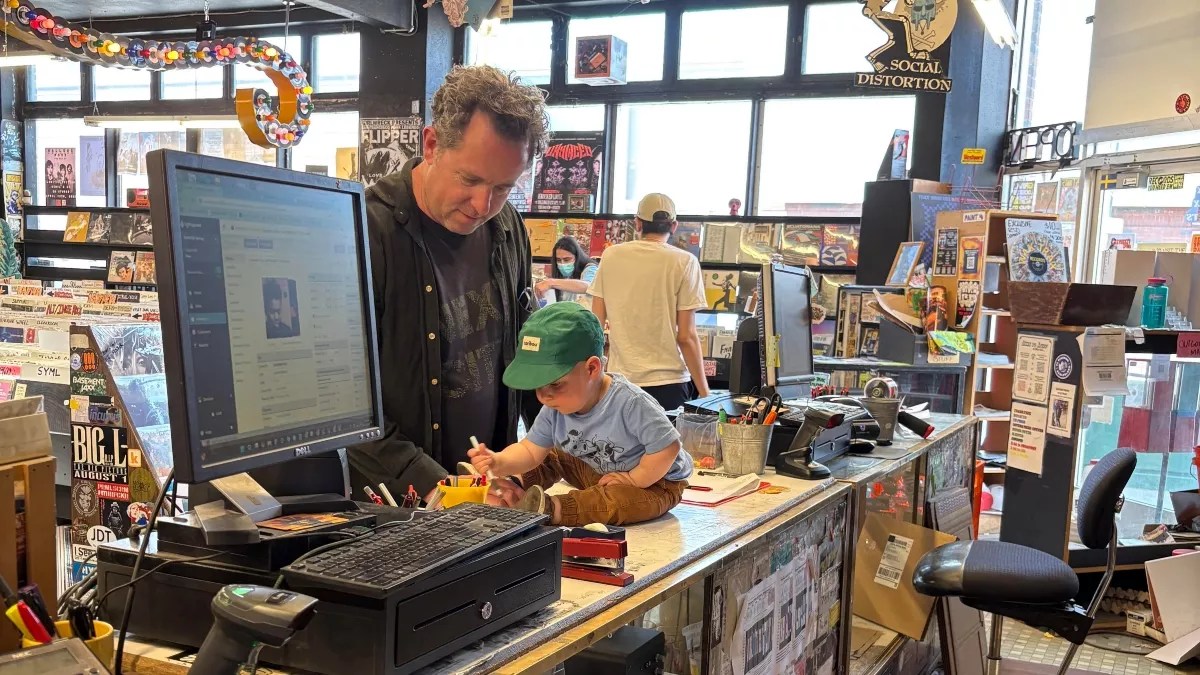
Courtesy of Pete Stidman

Audio By Carbonatix
Pete Stidman, owner of Wax Trax Records, is upbeat about opening a new branch of the iconic Denver music outlet next month at 3641 West 32nd Street, in the bustling Highlands neighborhood. But he admits that his excitement is accompanied by a touch of anxiety.
“Do I sometimes have trouble getting to sleep at night?” he asks. “Honestly, yes. It’s a risk. But everything in business is a risk.”
Fortunately for him, Wax Trax has beaten the odds for a half-century; it was founded in 1975. Countless national chains have vanished over its lifespan to date, but Wax Trax remains a local legend, as well as a must-stop for album addicts across the country. And Stidman is betting this streak will continue despite the decline of brick-and-mortar shopping across nearly every product category.
“I don’t think a record store is immune from competition with online and what we call mass-market retailers like Target and Walmart,” he concedes. “But I think record stores are very strong against those businesses for a lot of reasons. I recently went to a Walmart and looked at their record section, and it’s impersonal. You can see the covers, but there’s not that many records, and there’s nobody around to talk to about them. It’s not the same thing as going to a place and seeing all your peers at the shop at the same time, and somebody is actually playing music.
“There’s an authenticity to Wax Trax,” he continues. “Out of all our staff, probably half of them are in bands or are DJs or are in some kind of music production. You can’t get that anywhere else.”
This vibe has been present since the beginning. The store was founded by Jim Nash and Dannie Flesher, who would go on to start a groundbreaking record label called Wax Trax!, based in Chicago. But they allowed Duane Davis and Pete’s father Dave Stidman, who purchased the business from them in 1978, to continue operating as Wax Trax, sans the exclamation point.
The early years of the store are explored in Industrial Accident: The Story of Wax Trax! Records, a fine documentary that screened during the 2018 Denver Film Festival. But while Nash and Flesher went on to blow minds with the help of acts such as KMFDM, My Life With the Thrill Kill Kult and Ministry, led by Al Jourgensen, whose Colorado roots are explored in the 2003 Westword profile “Hometown Boy Makes Bad,” Denver’s Wax Trax had an equally noteworthy impact on the Colorado music scene. Stidman and Davis not only employed dozens upon dozens of aspiring musicians over the years, but they were open to every new genre or subgenre to come along, and their adventurous attitude was reflected in the wide variety of recordings they stocked, whether new or used.

Pete Stidman and his son Odo Stone Stidman at Wax Trax’s 638 East 13th Avenue headquarters.
Courtesy of Pete Stidman
The institutional knowledge inherent in Wax Trax’s hiring model is particularly important given the ongoing interest in vinyl among a new generation of consumers – people who value the the medium’s artisanal quality over streaming’s subpar sonics. But Stidman believes there’s more to vinyl’s continuing vitality than that.
“The sound has a warmer nature,” he maintains. “But it’s also about the whole aesthetic of buying an album and sitting down to listen to it, and enjoying that time, perhaps with somebody else. There’s an intentionality of going into a record store and talking to people about music and buying something new that’s really part of the bigger analog experience.”
Since taking over Wax Trax near the start of the 2020 pandemic, Stidman has steadily enlarged the brand’s footprint. The flagship store at 638 East 13th Avenue is actually two shops in one – the new-music outlet on the corner of 13th and Washington Street and the used-music operation a couple of doors down. There’s also the Broadway Bazaar, at 200 South Broadway, and a prime corridor spot at the Stanley Marketplace, 2501 Dallas Street in Aurora, plus a mobile mini-shop that can pop up practically anywhere in the Mile High. That makes the Highlands outlet either the third, fourth or fifth Wax Trax outpost, depending on who’s doing the counting.
For Stidman, the appeal of the Highlands is rooted in its accessibility: “I’m from Denver, but I spent a lot of time in Boston, and I like walkable neighborhoods. So when I started thinking about putting in a store west of I-25, I scoped out all the walkable neighborhoods in the area, and this was the best one. It also has a character of having a lot of locally owned businesses, which is nice, too.”
The grand opening at the new store is set for October 11, and while it’s still very much a work in progress, Stidman says the latest addition will retain the character of its original model, but with some fresh attributes.
“We never curate to a certain genre or group of genres,” he notes. “We try to carry something for everybody, whether it’s indie-folk or hardcore. Maybe country will sell better there – and even though we definitely sell a lot of Latin American and Mexican-regional music at 13th and Broadway, a lot of that community is traditionally on the north side. We base what we stock on what people buy and are interested in and talk about when they come in.”
Expanding into the Highlands is good business, Stidman contends: “We want to make sure that Wax Trax is around for a long time, so it makes sense to have a certain economy of scale.”
Such knowledge can’t entirely soothe Stidman’s nerves, but he’s grateful nonetheless. “When vinyl came back, we were well poised to take advantage, because my dad and Duane Davis didn’t quit,” he says. “But I feel lucky just to be involved with Wax Trax.”